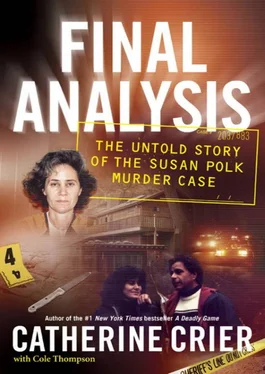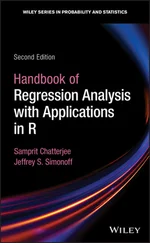“These things are obviously very important to you but they don’t seem to add or subtract from your case,” Judge Brady told Susan.
“I hope you don’t think I’m picking on you,” Susan told Gabriel before court adjourned that night. “You are aware that I loved all three of my sons the same?”
“Yes, I know,” he acknowledged. “You appreciate Eli a lot more now because he buys into your delusions and we don’t.”
On Tuesday, jurors arrived for a third day of cross-examination. Instead, they learned that Susan had asked for another delay.
“I’m sick and I think I’m getting bronchitis,” she sniffled.
The judge arranged to have her seen by a doctor; Brady also let Susan know that she was anxious to keep the proceedings moving along and hoped to resume court after lunch.
When Susan returned that afternoon, she reported that she had been prescribed antibiotics for her condition. She then requested an adjournment until the following Monday to get some “much needed rest.” “I was up half the night coughing,” she told the judge. “This is a murder trial and I want to be at my best.”
Judge Brady was sympathetic to Susan’s infirmity—she, too, was nursing a sore throat, but denied her request for what she deemed an “unreasonable” delay and ordered all parties back to court on Thursday, March 16. This adjournment was further evidence of the judge’s extraordinary patience. Brady rarely lost her cool even as Susan accused her of conspiring with the prosecutor or showing bias against the defense in front of jurors.
At times, Brady’s interchanges with Susan were akin to a kindergarten teacher scolding a young student, soothing the child until she calmed down. When it became clear that Susan could not be reigned in, Brady would order a “time out,” punishing Susan with fifteen minutes in a holding cell to regain her composure. Remarkably, Susan continued to push even as the judge reprimanded her. “Well, then I’m taking papers with me to read!” she told Brady after being ordered to the holding cell one afternoon.
“No,” the judge shot back. There was no reading during a time out.
It seemed that Susan had mastered the art of knowing just how far to push before landing in serious trouble, and she continued to press throughout the trial. Sometimes the judge’s latitude went too far as Brady allowed Susan to disrupt the flow of testimony and antagonize the prosecution. The end result was a highly irregular relationship between the bench and the attorneys, but in this case of many bizarre relationships, no one seemed particularly surprised.
On Thursday, jurors learned of yet another delay. An alternate juror had called in sick and, of course, there were more objections from the defendant. This time, Susan was upset that the leg shackles she was being forced to wear were causing runs in her pantyhose. Next, Susan objected to the prosecutor’s request to interrupt her cross-examination of Gabe so that he could put Adam on the stand. Adam had been waiting in the wings to testify for the prosecution since the trial had begun and was on the State’s list to take the stand after Gabe. But Adam was growing increasingly concerned that all the delays would prevent him from returning to UCLA in time for final exams and a scheduled trip to South Africa with his girlfriend.
Susan argued that it was unfair to disrupt her case merely to accommodate her son’s vacation plans. Besides, she felt that Gabriel’s testimony was too important to interrupt.
“You would think that the defendant might have some consideration for her child,” the prosecutor said.
“I object,” Susan shot back. “That’s an outrageous comment.”
“We will start fresh on Monday and hopefully move along,” the judge ruled, choosing to postpone the trial another day rather than replace the sick juror with an alternate. Already, one juror had been excused from the case and with the trial expected to last another two months, she did not want to risk losing another. This postponement would be the fourth delay since the trial began one week earlier.
Susan took two final shots at the prosecutor before the court adjourned Thursday. Out of earshot of jurors, she accused the D.A.’s office of “coaching” her two sons to slander both her and Eli on the stand. She also accused Sequeira of prosecutorial misconduct, charging that he deliberately tried to provoke a mistrial with his supposed underhanded strategies.
“I’d rather have needles shoved in my eye than have a mistrial,” Sequeira shot back.
“I would be very careful about making such accusations without any proof,” Judge Brady admonished Susan.
Court reconvened on Monday, March 20, with Susan continuing to question Gabriel about his childhood. “I don’t remember, I was five,” the teen responded to one question. “I was just a little kid,” he replied to another.
“I think we’re having a forest-for-the-trees problem,” Judge Brady told Susan at one point during her examination. “A lot of time is being spent on minutiae about events that are extremely important to you—again, I’m not telling you how to try your case, but my concern is that [the jury’s] attention will be lost for the important things.”
At the end of Monday’s proceedings, the judge informed Susan that she would allow her just one more day to question her son. She refused to bend even as Susan demanded to continue for “as much time as it takes to get to the truth.” Susan would have to finish her cross-examination by 5 PM Tuesday.
The following day, Susan escalated her attack, engaging the prosecutor in a number of heated exchanges.
Before Gabriel even took the stand that morning, Susan accused Sequeira of “making faces” in the courtroom. She claimed the prosecutor was rolling his eyes at jurors to imply that her cross-examination of her son was tedious.
“I can’t freeze my face,” Sequeira replied dryly, remarking that he had an expressive face.
Judge Brady intervened, telling Susan that she had not seen any “eye-rolling” on the part of the prosecutor, only a look of fatigue when Sequeira briefly shut his eyes in court.
“He is goading me,” Susan complained, talking over the prosecutor as he tried to defend against her latest accusation.
When he finally got the floor, Sequeira charged that Susan was making a “farce” of the trial with her unending objections, demands for a mistrial and accusations of prosecutorial misconduct “every fifteen minutes,” and he implored the judge to revoke Susan’s right to represent herself in court.
“We have gone far beyond the pale of what is reasonable,” he said, after jurors were cleared from the courtroom. “This jury, God knows what they’re thinking now.”
Even the court reporter voiced complaints about Susan’s behavior in court that day, at one point rising from her chair and telling the judge that it was impossible to record the proceedings with Susan repeatedly talking over the witness. When she complained a second time, Susan instructed the judge to “admonish the court reporter!”
Sequeira froze in disbelief. He had never seen anyone instruct a judge to reprimand a member of the court staff. But Brady remained calm, giving Susan more latitude until she, too, reached her limit and threatened to revoke Susan’s pro per status if she continued to ignore the court’s rules.
“The jury is getting forgotten in this equation,” Brady warned. “This pattern of behavior that we seem to be going through is alienating the jury.”
“The defendant’s style in this case is to be passive-aggressive,” Sequeira roared, accusing Susan of slyly introducing evidence in the pretext of questions. “She flouts this court’s authority at every opportunity so that it makes this trial somewhat of a farce.”
Читать дальше











